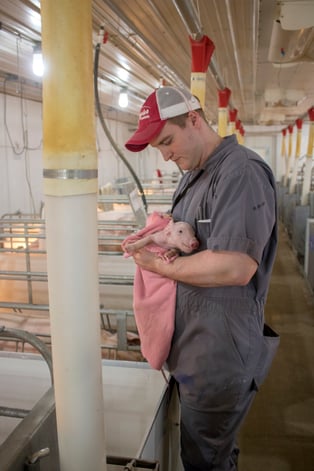
Source: New Standard Group
The New Standard team is all about the advancement of taking care of our animals in this industry. So are quite a few of our producers we come across in this field. Over the course of our time as a company, we were always curious about what the future of farming could be. We sat down with a handful of producers to ask just that. What they enjoy currently, and what, realistically or not, would they like to see in the next 10 years for the advancement of farming.
You have read all about Hunter Thomas view, now it’s time for Chet Mogler.
 Chet Mogler
Chet Mogler
Pig Hill/Mogler Farms
Q: How long have you been in the industry?
A: Our Family has been raising pigs since 1976. My grandfather looked to the pork industry as an opportunity to bring his kids back to the farm.
Q: How has technology changed the way barns operate today?
A: Many more systems are being electronically controlled, monitored, and connected.
Q: Where do you see things in the next 10 years?
A: Using Mega data to make decisions and real-time monitoring.
Q: What thing would you want, realistically or not, in the future for producers?
A: There are a few things.
- The biggest opportunity is utilizing technology to help farm workers to be fulfilled in their job and be as efficient as possible. There are certain aspects of animal husbandry that have biological complexity and are limited in their ability to be automated, but we must adapt technology in other areas of the barn where it is feasible. Livestock are living beings. However, being able to utilize technology in other areas of the barn will be key.
- Capturing all available data points and utilizing the information to establish parameters to warn the caretakers when something is out of spec. These data points may include but are not limited to: photo imaging, illness records, relative humidity, body weight, video analysis to watch pig behavior, temperature and sound.
- We are in an era where people are becoming more environmentally sensitive. Technology continues to help measure and reduce wastage of water, feed, and other items pertaining to environmental impact. New technologies such as in manure management are going to give us the ability to apply manure at a variable rate. This will help ensure that the soil and crop is getting the nutrients it needs but not more than it needs. It is also important to work hand in hand with government entities toward more comprehensive solutions as compared to regulations put in place that aren’t realistic. We producers want to preserve the ground and resources just like everyone else.
- One of the challenges with technology is that many companies hold the data they collect as proprietary. This limits what metrics that the producers have access to. Going forward producers will have to work with those companies that are willing to collaborate with others so that the best solution wins.



 Chet Mogler
Chet Mogler

